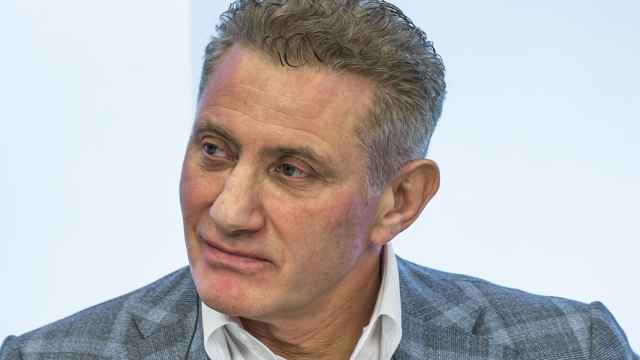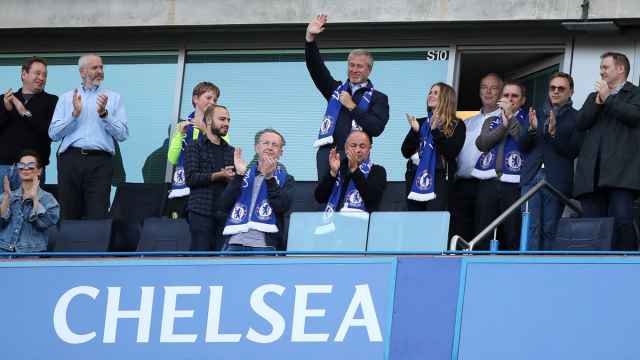The father of a Chechen immigrant to the United States shot by the FBI last week has cast doubt on the U.S. authorities' claims of acting in self-defense and said his son "could not have committed a crime," he said at a news conference Thursday.
Ibragim Todashev was killed during the early morning hours of May 22 at his condominium in Orlando, Florida by an agent questioning him over his ties to the Tsarnaev brothers, who are suspected of masterminding and executing the Boston Marathon bombings on April 15.
The FBI said immediately after the shooting that Ibragim had turned violent, though there have been conflicting reports, with some U.S. media saying he began brandishing a knife and other reports describing him trying to grab an agent's gun.
Abdulbaki Todashev traveled to Moscow for Thursday's news conference, convened with the hope of bringing the incident under more public scrutiny.
Coming from his hometown of Grozny, where he works in the city administration, Todashev arrived at the news conference straight from the U.S. Embassy, where he was interviewed for a visa application and told to expect a decision on Friday. He hopes to recover his son's body in Florida and investigate the circumstances of his violent death.
At the news conference, Abdulbaki presented pictures of his son's dead body to question the FBI's version of events, pointing out seven bullet wounds, with one in his forehead.
"My son was shot six times in the body and one time in the forehead. How could you shoot an armed person, who had turned violent, in his forehead?" Abdulbaki asked.
"Judging by these photos, the impression is that they came to rob him," he said.
Adding to skepticism about the official version of events, law enforcement officials in the U.S. said Wednesday that the interrogated person was unarmed, without providing any additional details, The Washington Post reported.
After four years of study at universities in Saratov and Grozny, Ibragim Tadashev traveled to the U.S. to study English as part of an exchange program. He stayed and obtained his green card in March, two months before his death.
In the beginning, he lived in Boston, where he met Dzhokhar and Tamerlan Tsarnaev, with whom he became friends, albeit not very close ones, his father said.
"They knew each other's phone numbers but didn't communicate very regularly because of Ibragim's move to Florida," Abdulbaki said.
According to Abdulbaki, his son could not have participated in the preparation or execution of the Boston Marathon bombings because he was in a hospital at the time and unable to walk.
The FBI was reportedly seeking answers about Todashev's possible connection to a triple murder in Waltham on Sep. 11, 2011, however, and not his involvement in the Boston events.
The FBI said earlier that Ibragim had confessed to his involvement in the Waltham case, in which three men were found dead with their throats slashed and marijuana sprinkled over their bodies.
Abduldaki, a father of 12 children, said he knew "his son could not have done this."
After obtaining his green card, Ibragim had planned to return to Chechnya for the summer, with tickets booked for May 24. He had not been back to Russia since his original departure in 2008.
The news conference was hosted by Maxim Shevchenko, a conservative television host on state-run Channel One, who suggested that the FBI may have had a reason to kill Ibragim two days before his planned trip to Russia.
The FBI has not yet issued an official explanation, saying the case is undergoing a thorough review that may take several months.
Contact the author at [email protected]
A Message from The Moscow Times:
Dear readers,
We are facing unprecedented challenges. Russia's Prosecutor General's Office has designated The Moscow Times as an "undesirable" organization, criminalizing our work and putting our staff at risk of prosecution. This follows our earlier unjust labeling as a "foreign agent."
These actions are direct attempts to silence independent journalism in Russia. The authorities claim our work "discredits the decisions of the Russian leadership." We see things differently: we strive to provide accurate, unbiased reporting on Russia.
We, the journalists of The Moscow Times, refuse to be silenced. But to continue our work, we need your help.
Your support, no matter how small, makes a world of difference. If you can, please support us monthly starting from just $2. It's quick to set up, and every contribution makes a significant impact.
By supporting The Moscow Times, you're defending open, independent journalism in the face of repression. Thank you for standing with us.
Remind me later.





